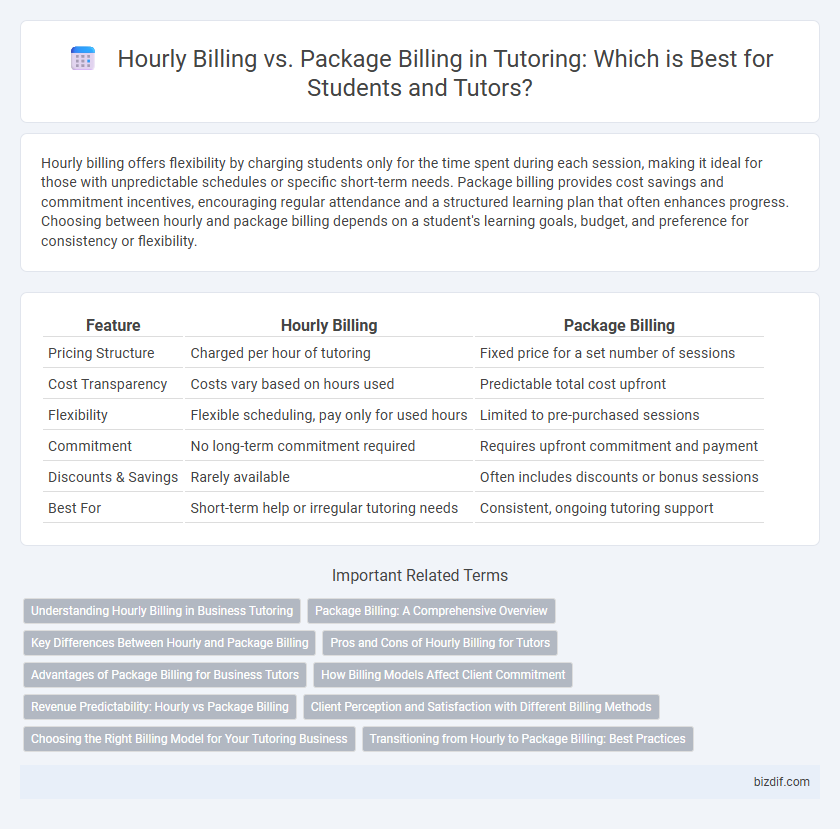Hourly billing offers flexibility by charging students only for the time spent during each session, making it ideal for those with unpredictable schedules or specific short-term needs. Package billing provides cost savings and commitment incentives, encouraging regular attendance and a structured learning plan that often enhances progress. Choosing between hourly and package billing depends on a student's learning goals, budget, and preference for consistency or flexibility.
Table of Comparison
| Feature | Hourly Billing | Package Billing |
|---|---|---|
| Pricing Structure | Charged per hour of tutoring | Fixed price for a set number of sessions |
| Cost Transparency | Costs vary based on hours used | Predictable total cost upfront |
| Flexibility | Flexible scheduling, pay only for used hours | Limited to pre-purchased sessions |
| Commitment | No long-term commitment required | Requires upfront commitment and payment |
| Discounts & Savings | Rarely available | Often includes discounts or bonus sessions |
| Best For | Short-term help or irregular tutoring needs | Consistent, ongoing tutoring support |
Understanding Hourly Billing in Business Tutoring
Hourly billing in business tutoring allows tutors to charge clients based on the exact time spent on sessions, offering flexibility and transparency in pricing. This model benefits students seeking tailored, on-demand support without committing to long-term packages. Tracking hourly rates, session length, and student progress ensures accurate invoicing and performance assessment in business tutoring services.
Package Billing: A Comprehensive Overview
Package billing in tutoring offers a cost-effective solution by bundling multiple sessions at a discounted rate compared to hourly billing, enhancing value for both students and tutors. This method encourages consistent learning and better commitment to long-term academic goals by securing a predetermined number of lessons. Tutors benefit from predictable income streams and reduced administrative tasks, while students gain flexible scheduling and potential access to supplementary resources or personalized study plans.
Key Differences Between Hourly and Package Billing
Hourly billing in tutoring charges clients based on the exact time spent, offering flexibility for short-term or irregular sessions, while package billing provides a fixed rate for a set number of sessions, promoting commitment and potential cost savings. Hourly rates often appeal to students needing sporadic help, whereas package billing benefits those seeking consistent, long-term support with predictable expenses. Key differences include payment structure, budgeting ease, and the incentive for continuous engagement versus ad-hoc assistance.
Pros and Cons of Hourly Billing for Tutors
Hourly billing for tutors offers flexibility in scheduling and payment, allowing students to pay only for the exact time they require, which can attract clients seeking short-term or occasional help. However, this model may lead to inconsistent income for tutors and can discourage comprehensive lesson planning, as time constraints may limit the depth and continuity of instruction. Tutors must balance the convenience of hourly rates with the potential instability and administrative overhead associated with tracking and billing each session individually.
Advantages of Package Billing for Business Tutors
Package billing for business tutors enhances revenue stability by securing upfront payment for multiple sessions, reducing administrative overhead associated with frequent invoicing. It also fosters stronger student commitment and engagement by encouraging a structured learning path with clear milestones. Offering bundled sessions can increase overall client retention and provide predictable cash flow, crucial for scaling tutoring operations effectively.
How Billing Models Affect Client Commitment
Hourly billing provides flexibility for clients, allowing them to pay only for the exact time used, which may result in lower initial commitment but less predictable long-term engagement. Package billing often encourages greater client commitment through discounted rates and predefined session bundles, fostering consistent attendance and improved learning outcomes. Tutors benefit from package billing by securing upfront payments, enhancing cash flow stability, and motivating clients to adhere to their learning schedules.
Revenue Predictability: Hourly vs Package Billing
Package billing offers higher revenue predictability by securing upfront payments for a set number of tutoring sessions, minimizing fluctuations caused by cancellations or rescheduling. Hourly billing can result in variable income due to inconsistent session frequency and last-minute changes made by students. Tutors seeking stable cash flow often prefer package billing to maintain consistent revenue streams.
Client Perception and Satisfaction with Different Billing Methods
Clients often perceive hourly billing as transparent and flexible, allowing them to pay strictly for the time utilized during tutoring sessions. Package billing tends to enhance satisfaction by offering a sense of commitment and cost savings, which many clients find more convenient and less stressful than tracking hours. Satisfaction levels generally increase when billing methods align with client expectations for predictability and value in tutoring services.
Choosing the Right Billing Model for Your Tutoring Business
Choosing the right billing model for your tutoring business depends on factors such as client preferences, session frequency, and income predictability. Hourly billing offers flexibility and transparency by charging per session, while package billing encourages commitment and provides upfront revenue through discounted multi-session deals. Analyzing student retention rates and workload can help determine the most effective approach to maximize profitability and client satisfaction.
Transitioning from Hourly to Package Billing: Best Practices
Transitioning from hourly to package billing in tutoring requires clear communication of value and transparent pricing structures to ensure client trust. Offering flexible package options tailored to common student needs helps streamline scheduling while improving revenue predictability for tutors. Tracking student progress and outcomes within packages emphasizes measurable benefits, fostering long-term client retention and satisfaction.
Hourly billing vs package billing Infographic

 bizdif.com
bizdif.com